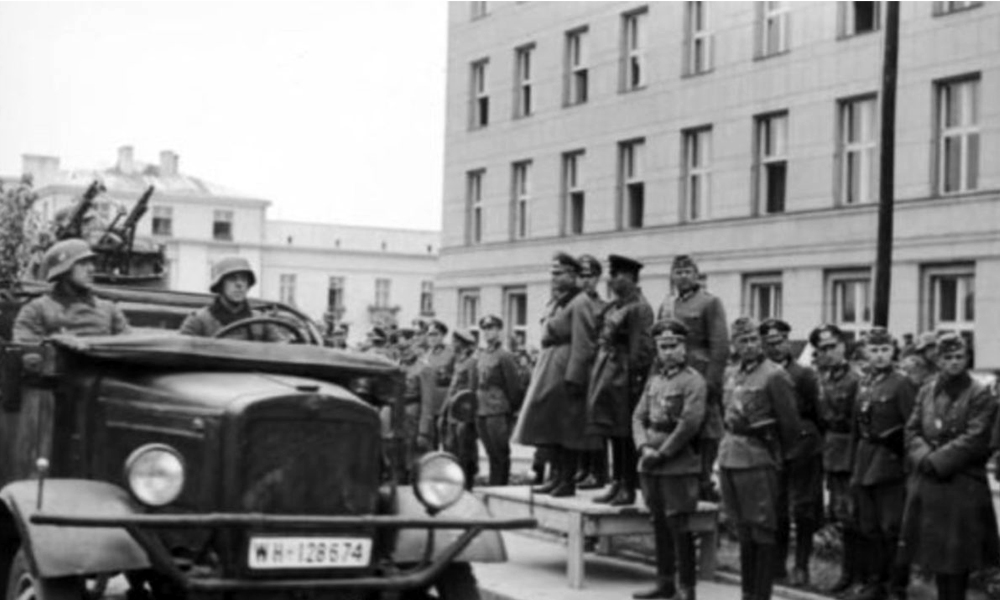a few references for those with more interest in this subject
German's rearmament, violation of the Versai treaty
During the Weimar era, there was extensive economic interaction between Germany and the
Soviet Union. A component of German rearmament was
covertly holding military training exercises in the Soviet Union to hide their extent from other countries.
Germany–Soviet Union relations of the interwar period were complex, as bellicosity and cooperation coexisted in tortuous combinations.
- Gordon H. Mueller, "Rapallo Reexamined: a new look at Germany's secret military collaboration with Russia in 1922." Journal of Military History 40.3 (1976): 109.
What did Hitler and Stalin think of each other?
Hitler once summed up Stalin brilliantly: "Stalin started as a desk clerk, and he is still a desk clerk." What he meant, of course, is that Stalin thought and acted like a mediocre bureaucrat, not a statesman and visionary like himself. Curiously, this opinion was shared by Stalin's arch-enemy, Leon Trotsky, who remarked to his followers, "Stalin is a mediocrity, but he is the best mediocrity in the Communist Party."
Stalin was startled by Hitler since the Fuhrer broke the stereotype, popular even today, that all Germans are obedient and law-abiding. In conversation with German journalist Emil Ludwig after Hitler came to power, Stalin laughed at how docile his German communist comrades had behaved during his one visit to Germany before World War I, then added, "But no one would say that of the Germans today"; a back-handed way of admiring Hitler for having radically changed the German national character.
Hitler appreciated Stalin. They respected each other as enemies and did not underestimate each other. Stalin showed less respect openly … Hitler somehow admired Stalin in his private talks…( not in public, understandably) .
Even in wartime and under the influence of propaganda, on 19 July 1941, Hitler stated:
"Stalin is one of the most extraordinary figures in world history. He began as a small clerk and has never stopped being a clerk. Stalin owes nothing to rhetoric. He governs from his office, thanks to a bureaucracy that obeys his every nod and gesture. It's striking that Russian propaganda always holds itself within certain limits in the criticisms it makes of us. Stalin, that cunning Caucasian, is ready to abandon European Russia if he thinks that a failure to solve her problems would cause him to lose everything. Let nobody think Stalin might reconquer Europe from the Urals! It is as if I were installed in Slovakia and could set out to reconquer the Reich. This is the catastrophe that will cause the loss of the Soviet Empire." Source: Goodreads
When we remember the beginning of the story, the Molotov-Ribbentrop pact:
The Molotov-Ribbentrop treaty was signed at 2 am on the 24th of 1939. The two dictators sealed Poland's fate and set in motion a chain of events that would soon engulf the globe in World War II.
Bottles of champagne were opened to toast the historic moment. Stalin raised his glass to Hitler's health. "A fine fellow," remarked the Soviet dictator. Yet, 21 months later, the pact would prove to be just another scrap of paper, for Nazi Germany and the Soviet Union would collide in a titanic struggle to become the most significant land war in history. Source: National interest
German's rearmament, how Lenin/Stalin helped in building Germany's weapons
Molotov - Ribbentrop pact
Katyn Forrest massacre, how Stalin intended to preempt Poland's post-war revolt
German's/USSR's combined attack on Poland and division of the country
The
Gestapo–NKVD conferences were a series of security police meetings organised in late 1939 and early 1940 by
Germany and the Soviet Union following the
invasion of Poland in accordance with the
Molotov–Ribbentrop Pact.
[1] The meetings enabled both parties to pursue specific goals and aims, as outlined independently by Hitler and Stalin, about the acquired formerly Polish territories.
[3] The Gestapo and the NKVD officials held the conferences in several Polish cities. Despite their differences on other issues,
Heinrich Himmler and
Lavrentiy Beria had similar objectives regarding the fate of
pre-war Poland.
[2][3] The objectives were agreed upon during the
German-Soviet Boundary and Friendship Treaty signing on 28 September 1939.
The Nazi-Soviet Pact: A Betrayal of Communists by Communists
A train of many trains, of forgotten trains. Special trains in which the NKVD transport German or Austrian communists to the German border deliver them to the Gestapo.
An excerpt from Bini Adamczak’s new book “Yesterday's Tomorrow: On the Loneliness of Communist Specters and the Reconstruction of the Future.”

thereader.mitpress.mit.edu





